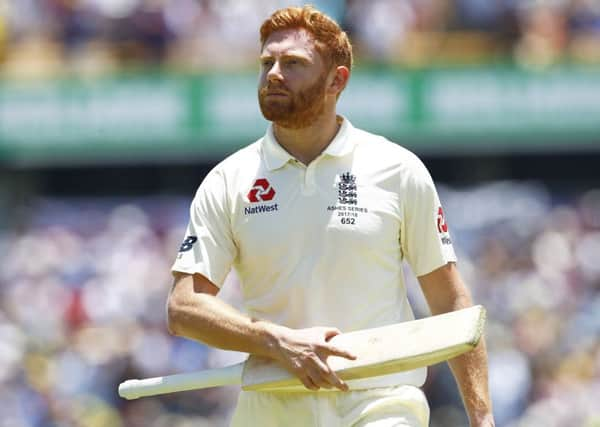Chris Waters: Jonny Bairstow's support for Test cricket should prompt urgent intervention


All is not lost.
An England cricketer has come out and said that Test cricket remains the pinnacle of his sport.
And while some of us can neither fathom nor excuse Adil Rashid’s decision to play white-ball only, at least Jonny Bairstow, his Yorkshire and England team-mate, believes that red- ball remains the ultimate challenge.
Advertisement
Hide AdAdvertisement
Hide Ad

Although Bairstow does not criticise the decision of Rashid and also that of Alex Hales, who has similarly abandoned red-ball for the more financially lucrative white-ball route, he is flying the flag for traditional cricket.
Some might say that Bairstow is more favourably placed to do so; after all, whereas Rashid, and, in particular, Hales were far from certain of regaining their Test spots, Bairstow is now an automatic pick.
But it was not so long ago that Bairstow himself was out of favour in five-day cricket and wondering where his next game was coming from.
His solution, unlike that of Rashid, was to knuckle down and fight for his place.
Advertisement
Hide AdAdvertisement
Hide Ad

Consequently, Bairstow now has 50 Test caps and should finish his career with well over 100.
When he retires, the 28-year-old will be remembered not just for comparatively ephemeral achievements in T20, but for lasting ones in a format in which all the great players have tested themselves for more than a century.
Bairstow, of course, knows the way that the wind is blowing.
Like James Anderson, the England pace bowler, he fears for the future of the five-day game, recognising that players will be increasingly tempted by the growing number of T20 franchise tournaments around the world.
Advertisement
Hide AdAdvertisement
Hide AdBairstow and Anderson both believe that Test cricket must be cherished in a climate in which players are eyeing much more money for much less work.
In the final analysis, it all comes down to cash; were that not so, are we to seriously suppose that Rashid would have lost all motivation for the red-ball game?
To these eyes, what those who condone the actions of Rashid and Hales fail to understand is that the game is now on a slippery slope.
As players earn more for playing T20, how long before even the best Test players are similarly tempted to maximise income in this way, diluting the product of the five-day game to the extent that it merely hastens its demise?
Advertisement
Hide AdAdvertisement
Hide AdUnless Test cricket is indeed cherished, which top players will be left to play it – and how many youngsters will grow up wanting to play it?
It is not merely a question of player choice or pragmatism, as the apologists claim, but a threat that is crying out for administrative attention.
For some players, the choice is easier than for others.
David Willey, for example, is highly unlikely to play Test cricket; he is not even guaranteed a place in Yorkshire’s County Championship team.
Unlike Rashid, however, who is guaranteed a place in that side and good enough to take several hundred Test wickets to boot, it would be difficult to criticise Willey if he ultimately pursued the white-ball path because his red-ball options are thin or even nonexistent.
Advertisement
Hide AdAdvertisement
Hide AdIt is when the likes of Rashid turn their backs – and when people blithely brush that off as a player exercising freedom of choice – that the threat level reaches its highest point.
So, what can be done?
Recognising that human nature tends to follow the bottom line, I find it impossible to disagree with Yorkshire’s director of cricket Martyn Moxon on this emotive issue.
Not long ago in these pages, Moxon insisted that the financial gap between red and white-ball needs to be closed to dissuade players from prioritising T20 riches over Test cricket.
How that will be achieved exactly is a conversation that the game needs to have urgently, with Yorkshire themselves leading the way by demanding an honest and open discussion.
Advertisement
Hide AdAdvertisement
Hide AdBut the subject must be tackled as soon as possible, and Test cricket made more attractive financially.
It is, of course, desperately sad when top players snub the red-ball format.
For many, it seems, sport is no longer about the glory, as Danny Blanchflower once put it, but about the cash – with any glory that comes along an added bonus.
When Bairstow says that he wants to play as much Test cricket as possible, “because you get remembered for how many Tests you’ve played”, he speaks like a sportsman in the proper sense.
Advertisement
Hide AdAdvertisement
Hide AdTo finish with one small example of Test cricket’s glory: will people remember Kevin Pietersen more for his part in helping England win the T20 World Cup in 2010, or for the fact that he scored 158 against Australia at the Oval in 2005 to help them regain the Ashes?
Needless to say, that question is rhetorical.